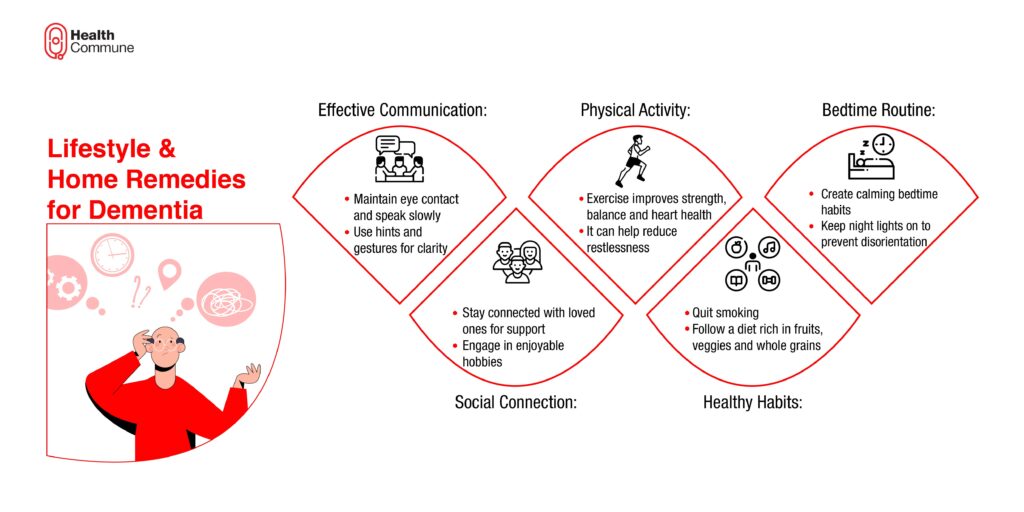According to the Global Burden of Disease report, 11.44 million individuals in India are anticipated to have dementia by the year 2050, up from 3.84 million in 2019. As a result of population growth, ageing, smoking, obesity, and diabetes, as well as general ignorance about the condition, this problem has become increasingly prevalent. Let’s learn more about dementia, its causes, symptoms, diagnosis, and treatment options.
What is dementia?
Dementia is an umbrella term for conditions that ultimately lead to a decline in cognitive function (i.e., the capacity for thought processing). It is chronic or progressive in nature and affects memory, cognition, orientation, comprehension, computation, learning ability, language, and judgement. There can also be changes in mood, emotional regulation, behaviour, and motivation.
What are the causes of dementia?
Dementia can be caused by:
- Alzheimer’s disease: This is the most widespread cause of dementia. Your brain accumulates two abnormal proteins called amyloid and tau proteins which stop the nerve cells in your brain from communicating with one another properly. As a result, the nerve cells start to die
- Parkinson’s disease: This is a degenerative brain illness associated with ageing that results in the breakdown of specific brain tissue. It is most commonly accompanied by tremors, rigidity, and bradykinesia (movements become slow and difficult to perform). Problems with thinking and memory, hallucinations and delusions, depression, and speech difficulties are also symptoms of this disease
- Normal pressure hydrocephalus (NPH): This disorder occurs when cerebrospinal fluid (CSF) accumulates in the gaps around your brain, leading to excessive pressure on the brain. A brain a infection, brain injury, brain bleeding, or prior brain surgery are all potential causes of this condition. Poor balance, forgetfulness, difficulty focusing, mood changes, frequent falls, and loss of bladder control are among the symptoms.
- Vascular dementia: In this, the blood vessels that supply your brain with oxygen get damaged, leading to sluggish thinking, challenges in problem-solving, and loss of focus and organisation
- Frontotemporal dementia: In this type, the frontal and temporal lobes of the brain’s nerve cells are affected and their connections break down. These areas are typically linked to language, behaviour, and personality
- Lewy body dementia: In this type of dementia, the nerve cells on the surface of your brain are affected by the accumulation of clumps of protein called Lewy bodies, which cause nerve cell injury. Symptoms include movement and balance issues, adjustments in sleep patterns, memory loss, difficulties with planning and problem-solving, and visual hallucinations and delusions
- Wernicke-Korsakoff syndrome: A serious thiamine (vitamin B1) shortage is the root cause of this neurological condition. It is most commonly due to alcohol use disorder, but it can also be caused by chronic infections or starvation. It is characterised by confusion, memory loss, hallucinations, confabulation in serious cases, coma and death.
- Mixed dementia: This type of dementia is a combination of two or more different types of dementia. Example: Alzheimer’s disease and vascular dementia
- Traumatic brain injury (TBI): In this condition, repetitive head trauma is the main cause. TBI may occur in boxers, football players, and soldiers. Based on the area of the brain that is affected, it can lead to depression, explosiveness, memory loss, and impaired speech
- Medication side effects: Dementia-like symptoms can be brought on by medication interactions and adverse drug reactions to certain classes of drugs like sleeping pills, anti-anxiety, and antidepressants drugs
- Subdural hematomas: The symptoms of dementia can be caused by bleeding between the surface of the brain and the covering over the brain, which frequently occurs in elderly people following a fall or injury.
- Huntington’s disease: This is a type of degenerative disease caused by genetic mutations. The first warning signs and symptoms, which include a sharp deterioration in cognitive abilities, typically appear between the ages of 30 and 40 years

What are the symptoms of dementia?
Each person is affected by dementia in a unique ,way depending on the underlying reasons, coexisting medical issues, and level of cognitive function. The signs and symptoms of dementia can be divided into three stages:
Early stage: Since dementia develops gradually, the early stage is frequently neglected. Typical signs might includes:
- Forgetfulness
- Getting lost in familiar locations
- Losing track of the time
Middle stage: The signs and symptoms of dementia that appear as it advances to the intermediate stage can include:
- Forgetting names of people, things, current events
- Having more and more trouble communicating, needing assistance with personal care, and displaying altered behavior, such as wandering and persistent questioning
Late stage: Dementia’s late stage is characterized by an almost complete dependence and inactivity that include:
- Losing track of time and place, having trouble identifying family and friends, and needing more help with basic self-care
- Walking with difficulty, exhibiting aggressive behaviour changes that could get worse
What are the risk factors of dementia?
- Age: The age group of 65 and older is at greater risk of developing dementia
- Positive family history
- Race and ethnicity: Black and Hispanic races are at a greater risk of developing dementia
- Brain injuries
- Down‘s syndrome: In this disease, people are born with an extra chromosome which affects the way their body and brain develop, and they are therefore more likely to develop dementia
How is dementia recognised?
To diagnose, dementia your doctor will review your medical history and symptoms and conduct a physical examination. They may also request tests such as lab tests, imaging, and neuropsychological exams to rule out the condition.
- Neurological evaluation: This involves testing for muscle tone, strength, reflexes, coordination, and senses
- Mental status and neuropsychological assessment: To evaluate memory, orientation, reasoning and judgement, language proficiency, and attention
- Psychiatric evaluation: A psychologist or psychiatrist can assess whether depression or another mental illness is causing your symptoms
- Lab testing: This rules out illnesses and ailments such as infections, inflammation, an underactive thyroid gland, and vitamin deficiencies as the cause of dementia (especially vitamin B12). In cases where autoimmune disorders and neurodegenerative diseases are suspected, a CSF (cerebrospinal fluid) analysis may be required.
- Imaging tests: MRI, CT, or PET scans are helpful to look for signs of neurodegeneration, hydrocephalus (buildup of fluid in the cavities deep within the brain), tumours, bleeding, and stroke
How is dementia treated?
There is no cure for dementia; only the symptoms can be managed. Treatment includes:
- Alzheimer’s disease: Drugs like donepezil, galantamine and memantine are used to reduce the cognitive symptoms of dementia. Sometimes other medications like antidepressants are also used to reduce behavioural symptoms
- Parkinson’s disease: Medications include drugs like levodopa, carbidopa, and selegiline Your doctor can also suggest deep brain stimulation and supportive therapies to help you cope with the condition
- Normal pressure hydrocephalus: It is a treatable condition but rarely treated with medications. The treatment involves surgery to implant the shunt, which helps drain the fluid
- Wernicke-Korsakoff syndrome: It is treated with vitamin B1 tablets or injections and with rehydration therapy like IV fluids
- Huntington’s disease: Medications like tetrabenazine and deutetrabenazine are used to reduce jerking movements and certain antipsychotic drugs such as quetiapine and olanzapine are also used to suppress violent outbursts and agitation. Your doctor might also suggest therapies like psychotherapy and physical therapy
- Brain tumours: Surgery, chemotherapy and radiation therapy are the three common treatment modalities
The symptoms of dementia and behavioural patterns can be reduced by certain non-drug therapies:
- You can learn coping mechanisms through occupational therapy and get tips on how to make your house safer. In addition to preventing and preparing you for the course of dementia, the goal is to avoid accidents like falls
- Dementia sufferers may find it simpler to concentrate and perform if there is less clutter and noise. Objects like knives and car keys that pose a security risk may need to be hidden
- Break projects into manageable steps and concentrate on success rather than failure. Routine and structure also lessen confusion in dementia sufferers
- Light exercise
- Other therapies like massage therapy, aromatherapy can also be practised
What are the lifestyle and home remedies for dementia?
- Maintain eye contact with your loved one while speaking. Don’t rush the response; speak slowly and in short terms. Make use of hints and gestures, such as pointing at things
- Strength, balance, and cardiovascular health are all enhanced by exercise in dementia patients. With symptoms like restlessness, exercise might also be beneficial
- Try to develop relaxing bedtime routines that are distant from the noise of the television, and meal cleanup: Keep the lights on at night in the bathroom, hallway, and bedroom to avoid being disoriented
- Maintain your social life. Keep in touch with your loved ones
- Stop smoking
- Follow a diet that consists primarily of fruits, vegetables, whole grains, fish, shellfish, nuts, and a small amount of red meat





